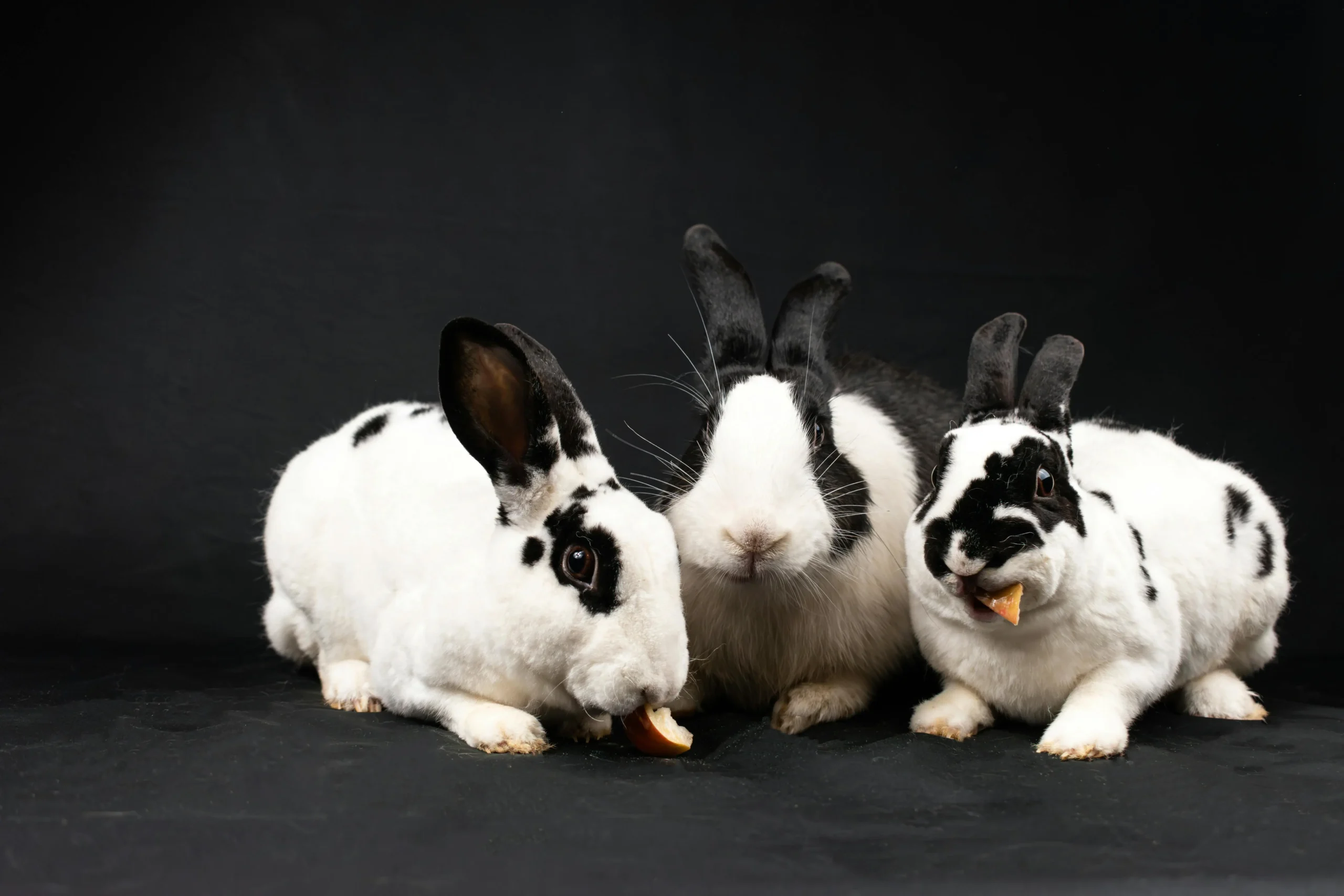Rabbits are delightful and playful pets that bring joy to any home. However, ensuring their health and happiness involves providing them with the proper nutrition. In this guide, we will delve into the 10 best foods for your bunny, along with feeding tips to keep them healthy and thriving.
Table of Contents
ToggleKey Takeaways: A Quick Overview of Rabbit Nutrition
A balanced rabbit diet should consist of:
-
80-90% hay
-
Fresh vegetables
-
A small amount of pellets
-
Occasional fruits and treats
These foods are important for supporting your rabbit’s digestive system, maintaining their health, and promoting overall well-being. Let’s explore each food group in more detail.
What Can Rabbits Eat? A Comprehensive Guide
As herbivores, rabbits rely entirely on plant-based food. The best diet for your rabbit involves providing a variety of high-fiber, fresh foods. Here’s a breakdown of the essentials:
Hay: The Core of a Rabbit’s Diet
Hay is the most important food for your rabbit. It should comprise the largest portion of their daily intake, providing essential fiber that promotes healthy digestion. Recommended types of hay for rabbits include:
-
Timothy Hay
-
Orchard Grass
-
Meadow Hay
Hay not only aids digestion but also helps wear down your rabbit’s teeth, which grow continuously. Always ensure that your rabbit has unlimited access to fresh hay throughout the day.
Rabbit Pellets: A Small Part of Their Diet
Pellets play a secondary role in your rabbit’s diet. Select plain, high-fiber pellets that contain no added sugars or artificial ingredients. Avoid muesli-style foods, as they can lead to selective eating and nutritional imbalances.
Treats: A Special Occasional Snack
While treats can be a delightful way to bond with your rabbit, they should be offered sparingly. Fresh fruits such as apples (without seeds), bananas, and berries are safe choices, but limit them to 1-2 tablespoons of fruit 2-3 times a week. Additionally, you can occasionally offer dried flowers or herbs.
Fruits: Sweet but Sparingly!
Rabbits enjoy sweet treats, but fruits should only be given in moderation. Healthy options include:
-
Apples (with seeds removed)
-
Strawberries
-
Watermelon
Due to their high sugar content, fruits should be given as a treat, not a staple food.
Vegetables: Leafy Greens Are Best
Leafy greens should form the bulk of your rabbit’s vegetable intake. These offer essential vitamins, minerals, and fiber. Some healthy options include:
-
Romaine lettuce
-
Kale
-
Dandelion greens
-
Parsley
-
Mint
Supplements: When Necessary
Most rabbits do not require additional supplements if they are provided with a balanced diet of hay, vegetables, and pellets. However, if your rabbit is deficient in specific nutrients, a vet may recommend supplements, such as calcium or vitamin A.
The 10 Best Foods Rabbits Love for a Healthy, Happy Bunny
Here are the top 10 foods your rabbit will love that also promote health and happiness:
-
Timothy Hay – The foundation of their diet, providing fiber to support digestion and dental health.
-
Romaine Lettuce – A nutritious leafy green packed with vitamins and minerals.
-
Kale – Full of fiber, calcium, and antioxidants to keep your rabbit’s immune system strong.
-
Parsley – High in vitamins A, C, and K, great for skin health and digestion.
-
Dandelion Greens – Rich in nutrients, they are a perfect addition to your rabbit’s diet.
-
Basil – A fragrant herb packed with vitamins, ideal for flavor and nutrition.
-
Apples (with seeds removed) – A sweet treat full of antioxidants and fiber.
-
Carrots (in moderation) – High in fiber and great for your rabbit’s teeth, but feed in small amounts due to sugar content.
-
Strawberries – A tasty, vitamin-rich treat that bunnies love.
-
Watermelon – Hydrating and refreshing, great for hot days as a treat.
What Do Wild Rabbits Eat? Exploring Their Natural Diet
Wild rabbits consume a variety of grasses, plants, and vegetables, feeding throughout the day. Their diet primarily consists of high-fiber plants and fresh grass. To replicate this in your pet rabbit’s diet, provide a variety of fresh hay and leafy greens throughout the day.
How To Choose the Best Rabbit Food for Your Pet
Choosing the right food for your pet bunny is essential. Their diet should include:
-
Unlimited fresh hay
-
A variety of leafy greens
-
Pellets in small quantities
-
Occasional fruits and treats
Be sure to choose high-quality, fresh food and avoid processed foods or those with added sugar or artificial colorings.
Foods to Avoid Feeding Your Rabbit
Certain foods are harmful to rabbits and should be avoided. These include:
-
Chocolate
-
Nuts
-
Seeds
-
Potatoes
-
Onions
-
Processed human foods
These foods can cause severe health problems, such as diarrhea, bloating, or even toxic reactions.
Rabbit Diet FAQs: Common Questions Answered
What is the healthiest thing to feed a rabbit?
The healthiest food for a rabbit is hay, especially Timothy hay, which should make up 80-90% of their diet. It’s rich in fiber and supports healthy digestion while helping to maintain their teeth.
What is 80% of a rabbit’s diet?
Approximately 80% of a rabbit’s diet should consist of high-fiber hay, such as Timothy hay, meadow hay, or orchard grass.
What is a rabbit’s favorite food?
Rabbits love leafy greens, such as romaine lettuce, parsley, cilantro, and dandelion leaves. They also enjoy occasional fruits like apples (without seeds) and berries.
Do rabbits need salt licks?
No, rabbits don’t require salt licks. They obtain the minerals they need from a well-balanced diet of hay, vegetables, and pellets.
How do I make my bunny happy?
To keep your bunny happy, ensure they have a spacious, enriching environment, plenty of hay, fresh vegetables, and the occasional treat. Regular playtime and bonding are also crucial.
Do bunnies like carrots?
Yes, rabbits enjoy carrots, but they should be given only as a treat, not a regular part of their diet, due to their high sugar content.
How to tell if a bunny is stressed?
Signs of a stressed bunny include hiding, loss of appetite, agitation, or tearing up fur. If you notice these signs, evaluate their living conditions and ensure they have enough enrichment.
Conclusion: Ensuring a Healthy Diet for Your Bunny
Providing the right diet is vital for your rabbit’s health and happiness. Make sure they have an unlimited supply of hay, a variety of leafy greens, a small amount of pellets, and occasional fruits as treats. Moderation is key when it comes to treats—offering them too frequently can lead to digestive issues and obesity.
Always consult your vet for personalized advice on your rabbit’s nutritional needs. Remember that fresh water is just as important as food, and should always be available to your bunny. By following these guidelines, your rabbit will live a long, healthy, and happy life, enjoying all the fun and joy they bring to your home.
Authentic Sources
-
RSPCA – Rabbit Diet: Provides comprehensive care tips for rabbit diets, including recommended foods and foods to avoid. RSPCA Website
-
PetMD – What Do Rabbits Eat: Detailed guide on rabbit diets and feeding tips, including best foods and treat options. PetMD Website
-
Best Friends Animal Society – Rabbit Diet: Provides feeding guidelines and food safety tips for pet rabbits. Best Friends Animal Society Website
-
Blue Cross – What Food Is Best for Rabbits: Expert advice on rabbit nutrition, offering practical tips on feeding your bunny. Blue Cross Website




